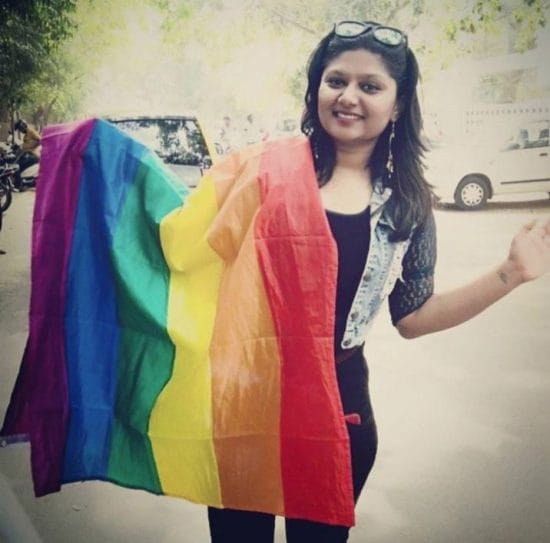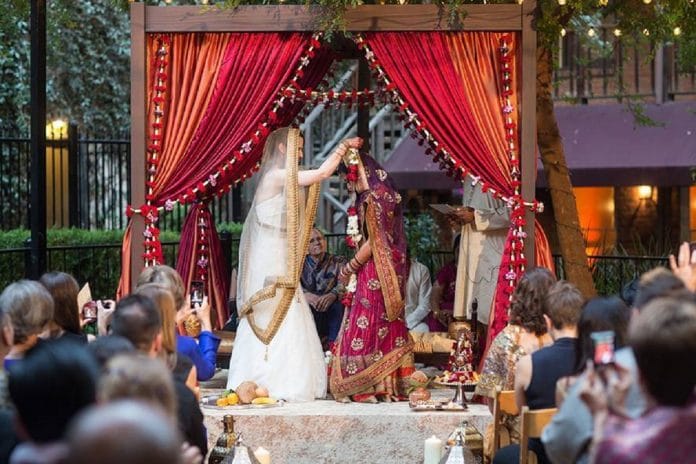While homosexuality is criminalised, it turns out that there is no law in India regarding marriage between people of the same sex.
New Delhi: Urvi Shah, 24, believes in the symphony of tradition and love. And her belief is helping dreams come true. Twenty-six and counting.
The daughter of a Gujarati printing press owner, Shah has set up India’s first and only matrimonial service for gays and lesbians, the Arranged Gay Marriage (AGM) Bureau. Rooted in the very Indian concept of arranged marriage, the bureau has become the one-stop shop for men and women who are wary of the hook-up culture and seek wedded bliss.

What about 377?
In light of the draconian, Raj-era Section 377 of the IPC, which criminalises sexual activities “against the order of nature”, one might wonder if the bureau is even legal.
On 24 August 2017, a nine-judge bench of the Supreme Court passed a historic verdict that declared the ‘right to privacy’ to be a fundamental right. This re-opened the debate surrounding the constitutional validity of Section 377, which curbed the freedom of sexual minorities.
While the decriminalisation of homosexuality is yet to be taken up in the Supreme Court, it turns out that there is no law in India regarding marriage between people of the same sex.
AGM functions in this grey legal area.
“Article 377 states that any ‘unnatural sex’ is a crime, so if homosexual couples are caught having sex they can be arrested. But there are no marriage laws specifically for homosexuals in India,” Shah told ThePrint.
“Technically, it’s not legal or illegal. So people can get married according to Hindu, Christian ceremonies or whatever community they belong to,” she said, adding, “But they won’t get any marriage certificate or rights.”
Thus, while the marriage is not technically recognised by law, it holds the symbolic value of a lasting commitment for couples.
Love, actually
Started in January 2016 with the help of a US-based NRI, Benhur Samson, AGM today has over 1,550 clients, signed up after a stringent vetting process, and many successful testimonials.
As of November 2017, the bureau had successfully helped 26 couples tie the knot in Hindu ceremonies. Over 39 couples who met through the agency were in live-in relationships, while many others had begun to date.
For some clients, signing up for AGM was a leap of faith, wary as they were about the concept in a country where homosexuality is still largely taboo. One of them, Maitree Basu, acknowledged on AGM’s website that she was “worried about sharing my documents with the company because I never wanted my identity to come out in public”.
But no longer. One of the gushing testimonials on the website, by customer C. Steven, talks about how much easier the portal made it for him to find his life-partner. “Profiles got exchanged, interests matched, feelings were expressed and we stepped into an eternal bonding of happiness & bliss. Kudos AGM for bringing longing souls together,” he wrote.
AGM “took stock of the obstacles a marginalised sexual minority might face in society”, and also “provided us with lawyers, counsellors, and more than that, the CEO, Urvi, Shah was always in touch”, wrote another client, Vishal Asnigar.
According to AGM, 75 per cent of their customers are Indian, mostly men from metropolitan cities such as Delhi, Mumbai and Bengaluru. Shah added that they catered to users from over 24 countries.
A treacherous journey
The journey hasn’t been easy for Shah, who often receives threat calls from family members of clients, asking her to stop encouraging “this kind of behaviour”.
“There are straight people who are against this, and there are even people from within the community who call this company fake, maybe because I didn’t enrol them,” she said.
Shah has been stalked, threatened and abused, but she says she doesn’t let such incidents faze her. “There are always chances of people being against what I do, but it’s just what it is, I know it’s part of my work,” she added.
When swiping isn’t enough
Shah’s portal for arranged marriage came at a time when the dating scene for gays and lesbians has been revolutionised by apps like Tinder, which allows you to toggle between genders in your search for dates, and Grindr, a dating app exclusively for gays. With several platforms to meet prospective partners of the same sex, how does AGM stand out?
Shah said on most of the dating sites for the community, “it’s mostly about sex”.
“After a certain age people want to settle down; they’re not fond of having multiple partners, but they don’t get many opportunities to meet compatible people who are also interested in having a single partner,” she added. Only four of AGM’s clients are under the age of 26.
Yash (name changed), a gay design student from Delhi, agrees with Shah. “By and large on Tinder, you’ll find someone who is looking for something short-term, as short as one night. And with Grindr it’s almost exclusively just hook-up culture,” he told thePrint.
Asked whether he thought a platform like AGM had potential in a country like India, Yash said, “Would I subscribe to it? No. But I do think it’ll work for India, because it also works within our existing family structures”.
“A mom who has accepted her son is gay will think, OK, at least I can help him settle down.”







As a regular consumer of the Print, I’d be very happy if Print did another story on this. In the light of new evidence it would be great to hear what your research has to say?
It is shocking to see “ThePrint” publishing a story then VICE doing a story where they very much convincingly show that the service Urvi Shah is running has very high probability of being fake .. Request ThePrint to take a look back into this story.
Urvi Shah is a SCAMSTER. Just saw the VICE Documentary for her scam.
VICE media has just uncovered this service as a scam.